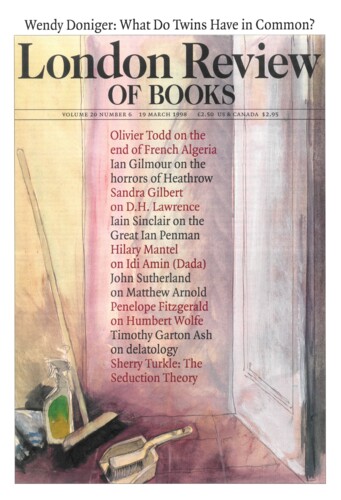Olivier Todd
Olivier Todd is the author of Albert Camus: A Life.
Mon Charabia: Bad Duras
Olivier Todd, 4 March 1999
For twenty years or so – but particularly after she hit the jackpot with her Goncourt Prize and sold a million copies of her most conventional novel, The Lover (1984) – Marguerite Duras was a literary monster. Her personality and the legends about her have fascinated readers of everything from Elle to the Village Voice. Laure Adler’s biography, the best so far, proves that the required period of mourning is over. Duras produced 73 books and about twenty films; her last posthumous work, No More, is currently available in a chi-chi edition and billed as her ‘raucous salutation welcoming death … a concatenation of words as pure as poetry and as full-throated as a fish-wife’s call.’ ‘I love my gibberish’ (‘mon charabia’), she used to say.’‘
A Glass of Whisky in One Hand and Lenin in the Other: the end of French Algeria
Olivier Todd, 19 March 1998
In 1954 I was stationed near Versailles, doing my national service with the 93rd Infantry Regiment. I had been called up for 12 months, but like many young Frenchmen of that unlucky generation, I was kept in the Army nearly two and a half years owing to unforeseen ‘events’ in North Africa. We weren’t old enough to have joined either the Free French in Britain or the Resistance against the Nazis in France. In those easy Manichaean years, not having read Koestler or Orwell, some of us even wished we’d been able to fight with the International Brigades in Spain. We could only nurse our nostalgia, and, as French citizens subject to national service, we were forced to take part in the unsavoury end of the colonial adventure in North Africa. Some of us felt we were involved in the wrong conflict, on the wrong side.‘
Pieces about Olivier Todd in the LRB
The Man from Nowhere: Burying André Malraux
John Sturrock, 9 August 2001
At André Malraux’s funeral, in November 1976, two red wreaths were delivered to the cemetery: one came from the French Communist Party, an organisation to which he never belonged, the...
Mediterranean Man
R.W. Johnson, 16 October 1997
By the time Albert Camus received the Nobel Prize for Literature in 1957 the nuanced position he took on the Algerian revolution had caused a scandal in orthodox progressive circles. Camus kept...
La Grande Sartreuse
Douglas Johnson, 15 October 1981
There will be many who will find it significant that Anne Whitmarsh, beginning a careful and detailed study of Simone de Beauvoir with a section called ‘Biographical Notes’, should...
Read anywhere with the London Review of Books app, available now from the App Store for Apple devices, Google Play for Android devices and Amazon for your Kindle Fire.
Sign up to our newsletter
For highlights from the latest issue, our archive and the blog, as well as news, events and exclusive promotions.


